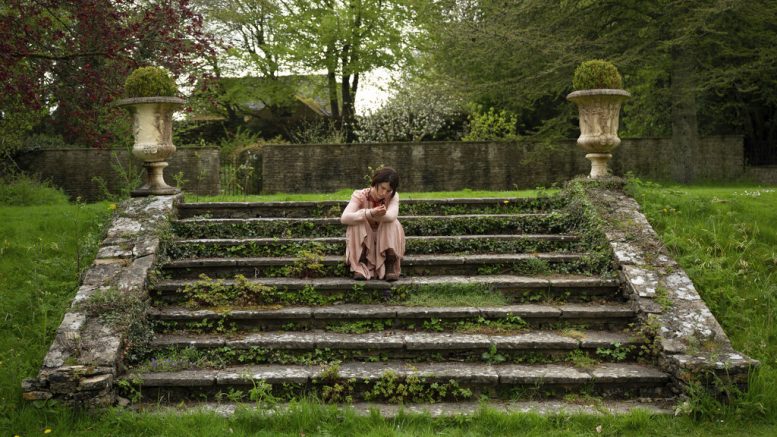The Associated Press
Somewhere in the southwest of England is a sprawling stone estate nestled along hedge-lined lanes that you can rent, complete with wood fireplaces, low oak beams, an apple tree in the yard, and a room for a baby grand piano. But the listing on Airbnb, Vrbo, or Booking.com might not mention one small complication: It comes with a naked dude in the yard.
This is where Alex Garland’s sophisticated horror film “Men” is set. All the action takes place in and around this estate, a countryside both sublimely beautiful and yet also grimy and filthy. What Garland is exploring is nature — but not nature itself. He’s after the nature of man. Not Man, but the base, sickening mankind that has proved toxic of late but has always been.
Into this 500-year estate comes Harper, a young widow from London who hasn’t really processed the final moments of her marriage. She’s played by rising star Jessie Buckley, pitch-perfect in every scene, alternating anger, fear, boldness, and timidity. Her Harper has booked a nice few days to unwind far away in the countryside, in nature. But she keeps coming across the nature of man.
Over 100 minutes, Harper will encounter many men — a vicar, a policeman, the house owner, the unclothed man in the yard, and even a 9-year-old boy, among them — who are needy, vain, misogynistic, morally bankrupt, and unkind. They all find some reason to blame Harper for something, the burden of so many women. Part of the film’s attraction is that all the males are played by Rory Kinnear, a shapeshifter of the highest order. But the effect is pulled to ridiculous lengths by projecting his face on the 9-year-old’s body, undercutting the whole contrivance.
The problem with “Men” isn’t with the acting. It’s with a script that could be described as attempting at something like arty horror and can’t stick the landing. Often it is tedious, slow to build, and pretentious. Garland has proved masterful in sci-fi with “Ex Machina” and the criminally underappreciated series “Devs,” but here with ancient myths, thick forests, figurative stone carvings, and heavy symbolism, he’s lost his way. Often, it is clumsy, like his riff of Eden. After Harper innocently eats an apple on the estate’s front yard, she is reproached by the owner and we can see the future: Men being nasty. “I didn’t come here to be afraid,” she says, but this is the hand she’s dealt.
This is a film pregnant with Big Ideas, where the visuals and music and dialogue are all heightened to an overthought level. Harper goes into a tunnel in the woods and happily creates vocal echoes — until she is thwarted by a sinister male figure. The tunnel equals uterus, we suspect. But we need more. And the film’s horrific end sequence, which shows a female-less reproduction of a sequence of men giving birth to a line of bloody, unhappy men, feels too much, like a cinematic lecture about masculinity with special effects. At one point, Harper calls the police and the dispatcher could represent all of us when she asks: “Explain what’s happening, please.”
Director of photography Rob Hardy, a longtime Garland collaborator, is a master at stillness and signals, capturing the beauty of a forest in one moment for its wildflowers, rain droplets in a puddle or a slo-mo dandelion in the wind, but also its terror and muck. Yet his work is so heavy with allegory and meaning that it gets numbing.
At its heart, “Men” has some interesting things to say, about grief and loss and guilt. Harper, who had a terrible fight before she lost her husband, has an unthinkable recovery ahead. But her trip to the countryside has led to a dead deer corpse with specific but opaque meaning, some W.B. Yeats quotes thrown in there and a clown car full of nasty men, one naked. Reviewing this Airbnb offering is never going to end up with it getting five stars.
“Men,” an A24 release, is rated R for “disturbing and violent content, graphic nudity, grisly images, and language.” Running time: 100 minutes. One and a half stars out of four.




































